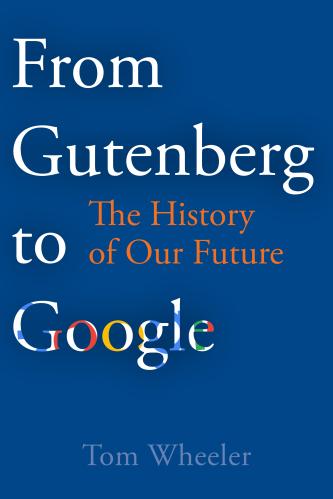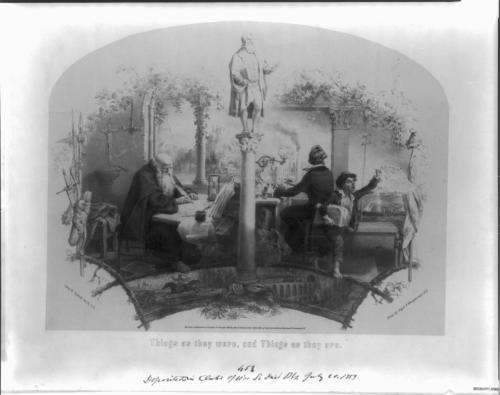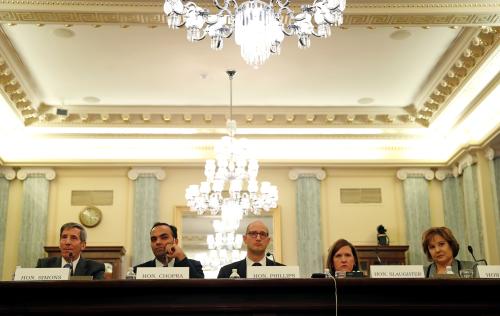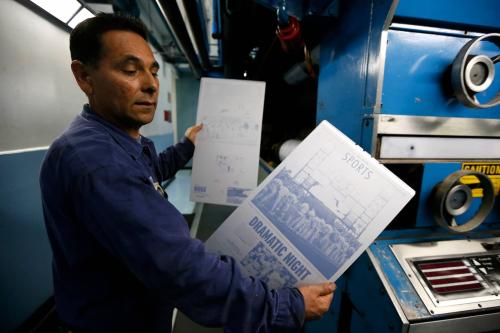Tom Wheeler is the author of the book “From Gutenberg to Google: The History of our Future“, available from the Brookings Institution Press on February 26, 2019.
“We must root out printing or printing will root us out,” the Vicar of Croydon told his 16th century parishioners. The cleric was responding to Gutenberg’s discovery not just as a standalone technology, but as an information network. His lament differs little from what we hear about the effects of the internet today.
In my new book, “From Gutenberg to Google,” I examine the two great network revolutions of the past—the aforementioned printing press in the 15th century, as well as the combination of the railroad and telegraph in the 19th century—to put in historical perspective the confusion and uncertainty brought about by the internet today. Though current technology may be causing massive societal changes faster than ever before, the book discusses how these past upheavals shed light on how to deal with the issues of the information age.
We incorrectly assume the upheaval created by our new technologies are unique. We are living through history’s third great period in which new network technology dismantled the security of the status quo. Gutenberg’s breakthrough was the original information revolution. Four centuries later, the steam railroad became the first high-speed network. Concurrent with the revolution in steam, sparks on telegraph lines created the first electronic network. Like today, each of these technologies imposed disturbing dislocations and disruptions on individuals and institutions. Today’s internet is a reprise of those experiences.
Once again, we are learning that it is the secondary effects rather than the primary technology that transform commerce and culture. Gutenberg’s press had the effect of stimulating the Reformation and disseminating the Renaissance, thus upending the security and stability of centuries of accepted truths. The railroad enabled the industrial revolution, destroyed the agrarian subsitence economy that had supported humankind since the domestication of crops and animals, and redrew the map around expanding urban areas. The telegraph allowed for the management of national corporations, created a national media, and opened up national financial markets.
In response to these changes, the forces of the status quo pushed back. As printing’s free flow of ideas threatened its hegemony, the Catholic Church countered with censorship and excommunication. Businesses from cabals to stage coach and freight companies joined local merchants in trying to limit the railroad. Preachers thundered from the pulpit that sending messages by telegraph sparks was black magic.
The effects of our new network technology are similarly disruptive and destabilizing. But our experiences aren’t unique. Technologically, today’s “new” capabilities are derivative of earlier technologies. How society and economic activity responded to those earlier technologies echo in today’s reaction to their offspring. As a result, there are lessons we can take from the network revolutions of history that we would be well-served to understand today.
New technology always stimulates dire warnings. “Is Google making Us Stoopid?” a 2008 article in The Atlantic worried. An Ohio schoolboard was even more worried about the impact of the railroad on students, condemning the innovation as “a device of Satan to lead immortal souls to hell.” When the cover of New York magazine headlined “Put Down Your Phone,” it is not hard to hear a mid-1800s Indiana newspaper’s warning that the railroad would destroy civilization. “All conceptions will be exaggerated by the magnificent notions of distance,” the editor warned. “Why you will not be able to keep an apprentice boy at his work! Every Saturday evening he must have a trip to Ohio to spend Sunday with his sweetheart. Grave plodding citizens will be flying about like comets. All local attachments will be at an end.”
Economic protectionism is the default response to new technology. Long before online shopping affected local merchants, local tradesmen pushed back against the effect of new networks on their livelihood. “MOTHERS LOOK OUT FOR YOUR CHILDREN!” blared an 1839 campaign by Philadelphia merchants against the connection of the city’s rail lines. The merchants whose businesses would be bypassed by the through trains could not come right out and talk about their self-interest, so they invented a public safety scare. As the coup de grâce, the campaign’s posters warned the connection would turn Philadelphia into a “SUBURB OF NEW YORK!!”
Through it all, however, the threat to one is an opportunity for another. When Gustavus Swift invented the refrigerated railcar in 1878, he did to local butchers what Google would do to the local advertising business over a century later. Slaughtering in Chicago abattoirs was significantly less expensive than one-off local butchers doing the same thing. Add to this the savings from transporting only the edible cuts of beef rather than the whole animal, and Swift improved the American diet while destroying a cornerstone of local economic activity.
The lesson of history is that the “good old days” that seem so stable in retrospect were in reality as destabilized by new technology as our own time.








Commentary
With new technology challenges, remember we’ve been here before
February 22, 2019